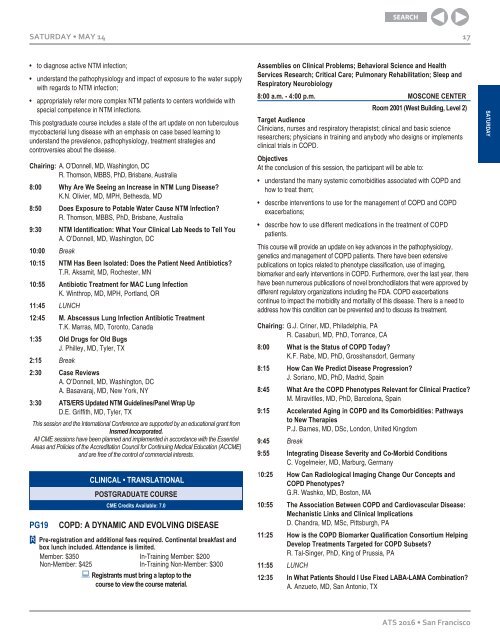Final Program
h6okmgq
h6okmgq
You also want an ePaper? Increase the reach of your titles
YUMPU automatically turns print PDFs into web optimized ePapers that Google loves.
SATURDAY • MAY 14 17<br />
• to diagnose active NTM infection;<br />
• understand the pathophysiology and impact of exposure to the water supply<br />
with regards to NTM infection;<br />
• appropriately refer more complex NTM patients to centers worldwide with<br />
special competence in NTM infections.<br />
This postgraduate course includes a state of the art update on non tuberculous<br />
mycobacterial lung disease with an emphasis on case based learning to<br />
understand the prevalence, pathophysiology, treatment strategies and<br />
controversies about the disease.<br />
Chairing: A. O’Donnell, MD, Washington, DC<br />
R. Thomson, MBBS, PhD, Brisbane, Australia<br />
8:00 Why Are We Seeing an Increase in NTM Lung Disease?<br />
K.N. Olivier, MD, MPH, Bethesda, MD<br />
8:50 Does Exposure to Potable Water Cause NTM Infection?<br />
R. Thomson, MBBS, PhD, Brisbane, Australia<br />
9:30 NTM Identification: What Your Clinical Lab Needs to Tell You<br />
A. O’Donnell, MD, Washington, DC<br />
10:00 Break<br />
10:15 NTM Has Been Isolated: Does the Patient Need Antibiotics?<br />
T.R. Aksamit, MD, Rochester, MN<br />
10:55 Antibiotic Treatment for MAC Lung Infection<br />
K. Winthrop, MD, MPH, Portland, OR<br />
11:45 LUNCH<br />
12:45 M. Abscessus Lung Infection Antibiotic Treatment<br />
T.K. Marras, MD, Toronto, Canada<br />
1:35 Old Drugs for Old Bugs<br />
J. Philley, MD, Tyler, TX<br />
2:15 Break<br />
2:30 Case Reviews<br />
A. O’Donnell, MD, Washington, DC<br />
A. Basavaraj, MD, New York, NY<br />
3:30 ATS/ERS Updated NTM Guidelines/Panel Wrap Up<br />
D.E. Griffith, MD, Tyler, TX<br />
This session and the International Conference are supported by an educational grant from<br />
Insmed Incorporated.<br />
All CME sessions have been planned and implemented in accordance with the Essential<br />
Areas and Policies of the Accreditation Council for Continuing Medical Education (ACCME)<br />
and are free of the control of commercial interests.<br />
PG19<br />
CLINICAL • TRANSLATIONAL<br />
POSTGRADUATE COURSE<br />
CME Credits Available: 7.0<br />
COPD: A DYNAMIC AND EVOLVING DISEASE<br />
Pre-registration and additional fees required. Continental breakfast and<br />
box lunch included. Attendance is limited.<br />
Member: $350 In-Training Member: $200<br />
Non-Member: $425 In-Training Non-Member: $300<br />
Registrants must bring a laptop to the<br />
course to view the course material.<br />
Assemblies on Clinical Problems; Behavioral Science and Health<br />
Services Research; Critical Care; Pulmonary Rehabilitation; Sleep and<br />
Respiratory Neurobiology<br />
8:00 a.m. - 4:00 p.m. MOSCONE CENTER<br />
Room 2001 (West Building, Level 2)<br />
Target Audience<br />
Clinicians, nurses and respiratory therapistst; clinical and basic science<br />
researchers; physicians in training and anybody who designs or implements<br />
clinical trials in COPD.<br />
Objectives<br />
At the conclusion of this session, the participant will be able to:<br />
• understand the many systemic comorbidities associated with COPD and<br />
how to treat them;<br />
• describe interventions to use for the management of COPD and COPD<br />
exacerbations;<br />
• describe how to use different medications in the treatment of COPD<br />
patients.<br />
This course will provide an update on key advances in the pathophysiology,<br />
genetics and management of COPD patients. There have been extensive<br />
publications on topics related to phenotype classification, use of imaging,<br />
biomarker and early interventions in COPD. Furthermore, over the last year, there<br />
have been numerous publications of novel bronchodilators that were approved by<br />
different regulatory organizations including the FDA. COPD exacerbations<br />
continue to impact the morbidity and mortality of this disease. There is a need to<br />
address how this condition can be prevented and to discuss its treatment.<br />
Chairing: G.J. Criner, MD, Philadelphia, PA<br />
R. Casaburi, MD, PhD, Torrance, CA<br />
8:00 What is the Status of COPD Today?<br />
K.F. Rabe, MD, PhD, Grosshansdorf, Germany<br />
8:15 How Can We Predict Disease Progression?<br />
J. Soriano, MD, PhD, Madrid, Spain<br />
8:45 What Are the COPD Phenotypes Relevant for Clinical Practice?<br />
M. Miravitlles, MD, PhD, Barcelona, Spain<br />
9:15 Accelerated Aging in COPD and Its Comorbidities: Pathways<br />
to New Therapies<br />
P.J. Barnes, MD, DSc, London, United Kingdom<br />
9:45 Break<br />
9:55 Integrating Disease Severity and Co-Morbid Conditions<br />
C. Vogelmeier, MD, Marburg, Germany<br />
10:25 How Can Radiological Imaging Change Our Concepts and<br />
COPD Phenotypes?<br />
G.R. Washko, MD, Boston, MA<br />
10:55 The Association Between COPD and Cardiovascular Disease:<br />
Mechanistic Links and Clinical Implications<br />
D. Chandra, MD, MSc, Pittsburgh, PA<br />
11:25 How is the COPD Biomarker Qualification Consortium Helping<br />
Develop Treatments Targeted for COPD Subsets?<br />
R. Tal-Singer, PhD, King of Prussia, PA<br />
11:55 LUNCH<br />
12:35 In What Patients Should I Use Fixed LABA-LAMA Combination?<br />
A. Anzueto, MD, San Antonio, TX<br />
SATURDAY<br />
ATS 2016 • San Francisco


